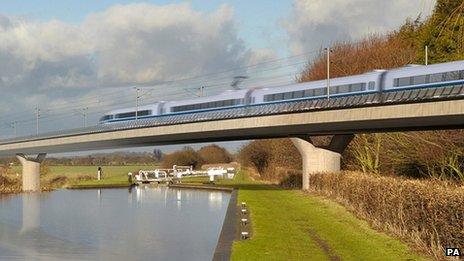HS2 legislation outlined in Queen's Speech
- Published

The first trains are expected to run on the HS2 line in 2026
Legislation paving the way for development of the HS2 train line has been announced in the Queen's Speech.
A bill would grant parliamentary permission to build phase one of the £16.3bn line from London to Birmingham and the powers to operate it.
Construction on the high speed project, opposed by some residents' groups and councils, is set to begin in 2016/17.
Another bill sets up the financial powers to proceed with a second phase, taking HS2 to Leeds and Manchester.
The High Speed Rail (Preparation) Bill would allow expenditure on construction and design on the HS2 project "quicker than otherwise possible".
It aims to provide the Parliamentary authority for ecological surveys and other preparatory work to take place and to pay compensation to property owners along the route.
The bill would also allow funding to be made available for the early design stages of the Y-shaped route to Manchester via Crewe and to Leeds, via the East Midlands and Sheffield, at a cost of £16.7bn.
But further laws will need to be passed before construction on phase two of the line, scheduled to be completed in 2032-2033, can take place.
The government needs to pass the Preparation Bill before the HS2 Hybrid Bill to build and construct the line, which also includes powers to make compulsory purchases of land.
This Preparation Bill, which will apply to England, Scotland and Wales, also allows for "preparatory work for future phases of a high speed rail network at the appropriate time".
The Queen told MPs and peer the HS2 project would provide "further opportunities for economic growth in many of Britain's cities".
It is hoped the first trains will run on the HS2 line around 2026.
The Department for Transport says phase one will cut London to Birmingham travel to 49 minutes, from the current one hour and 24 minutes.
The HS2 phase two would virtually halve journey times between Birmingham and Manchester - to 41 minutes - and between London and Manchester from two hours and eight minutes to one hour and eight minutes.
Speeds of up to 250mph on HS2 would reduce a Birmingham to Leeds journey from two hours to 57 minutes.
'Vanity project'
Supporters of HS2 says it holds massive future benefits for the economy and would cut emissions from air travel.
Critics - many in traditional Tory-voting areas - argue that HS2's predicted economic benefits have been overestimated by the government, and suggest swathes of picturesque countryside would be blighted by the railway.
More than 70 groups oppose HS2. Eighteen councils along the route which are against the scheme, known as the 51m group, say that taxpayers cannot afford the line and it will increase greenhouse gas emissions.
But Michael Roberts, chief executive of the Association of Train Operating Companies, said: "This commitment is the next important step in securing a modern high-speed rail network linking the north and south of Britain which will unlock significant economic and environmental benefits."
He said the legislation was "good news for both passengers and the economy and " key to providing the extra capacity today's booming rail industry will need in the years ahead".
Institution of Civil Engineers director general Nick Baveystock said the plan "presents an opportunity to bring about a real step-change in rail capacity and help regenerate and boost the economies of our city regions".
Matthew Sinclair, chief executive of the TaxPayers' Alliance, which campaigns for lower taxes, said HS2 was a "great vanity project... poor value compared to more affordable alternatives, but there is still time to reconsider that white elephant".